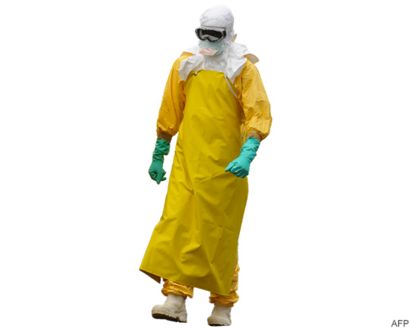
Please turn on JavaScript. Media requires JavaScript to play.
President Johnson Sirleaf on BBC Newshour: "The time for talking or theorising is over"
Liberian President Ellen Johnson Sirleaf says the whole world has a stake in the fight against Ebola.
In a "letter to the world" broadcast by the BBC, she said the disease "respects no borders", and that every country had to do all it could to help fight it.
President Johnson Sirleaf added that a generation of Africans were at risk of "being lost to economic catastrophe".
The Ebola outbreak has killed more than 4,500 people across West Africa, including 2,200 in Liberia.
International donors have given almost $400m (£250m) to UN agencies and aid organisations, short of the $988m requested.
In the worst-affected countries - Guinea, Liberia and Sierra Leone - about 9,000 people have been found to have the virus, which kills an estimated 70% of those infected.
Fragile states
The letter, published on Ms Johnson Sirleaf's website and read out on the BBC's Newshour programme, starts with the words "Dear World".
She goes on to say that the fight against Ebola "requires a commitment from every nation that has the capacity to help - whether that is with emergency funds, medical supplies or clinical expertise".
"We all have a stake in the battle against Ebola," she says. "It is the duty of all of us, as global citizens, to send a message that we will not leave millions of West Africans to fend for themselves."
She said it was not a coincidence that Ebola had taken hold in "three fragile states... all battling to overcome the effects of interconnected wars".
Liberia, she noted, had about 3,000 qualified doctors at the start of the civil war in the late 1980s - and by its end in 2003 it had just three dozen.
The latest crisis in West Africa is the worst-ever Ebola outbreak.
The virus spreads between humans by direct contact with infected blood, bodily fluids or organs, or indirectly through contact with contaminated environments.
How not to catch Ebola:
- Avoid direct contact with sick patients as the virus is spread through contaminated body fluids
- Wear goggles to protect eyes
- Clothing and clinical waste should be incinerated and any medical equipment that needs to be kept should be decontaminated
- People who recover from Ebola should abstain from sex or use condoms for three months
Ebola basics: What you need to know
How Ebola attacks
What virus has hit - in maps
Uncertainty over figures
Continue reading the main storyINTERACTIVE
- ×

- ×
The cap forms part of a protective hood covering the head and neck. It offers medical workers an added layer of protection, ensuring that they cannot touch any part of their face whilst in the treatment centre.
- ×
Goggles, or eye visors, are used to provide cover to the eyes, protecting them from splashes. The goggles are sprayed with an anti-fogging solution before being worn.
- ×
Covers the mouth to protect from sprays of blood or body fluids from patients. When wearing a respirator, the medical worker must tear this outer mask to allow the respirator through.
- ×
A respirator is worn to protect the wearer from a patient's coughs. According to guidelines from the medical charity Medecins Sans Frontieres (MSF), the respirator should be put on second, right after donning the overalls.
- ×
A surgical scrub suit, durable hospital clothing that absorbs liquid and is easily cleaned, is worn as a baselayer underneath the overalls. It is normally tucked into rubber boots to ensure no skin is exposed.
- ×
The overalls are placed on top of the scrubs. These suits are similar to hazardous material (hazmat) suits worn in toxic environments. The team member supervising the process should check that the equipment is not damaged.
- ×
A minimum two sets of gloves are required, covering the suit cuff. When putting on the gloves, care must be taken to ensure that no skin is exposed and that they are worn in such a way that any fluid on the sleeve will run off the suit and glove. Medical workers must change gloves between patients, performing thorough hand hygiene before donning a new pair. Heavy duty gloves are used whenever workers need to handle infectious waste.
- ×
A waterproof apron is placed on top of the overalls as a final layer of protective clothing.
- ×
Ebola health workers typically wear rubber boots, with the scrubs tucked into the footwear. If boots are unavailable, workers must wear closed, puncture and fluid-resistant shoes.
Have you been affected by the issues raised in this story? You can email haveyoursay@bbc.co.uk
Send your pictures and videos to yourpics@bbc.co.uk or text them to 61124 (UK) or +44 7624 800 100 (international). Or you can upload here.
Read the terms and conditions.
Anda sedang membaca artikel tentang
All nations 'have a stake' in Ebola
Dengan url
http://beritaberbagiceria.blogspot.com/2014/10/all-nations-have-stake-in-ebola.html
Anda boleh menyebar luaskannya atau mengcopy paste-nya
All nations 'have a stake' in Ebola
namun jangan lupa untuk meletakkan link
All nations 'have a stake' in Ebola
sebagai sumbernya
0 komentar:
Posting Komentar